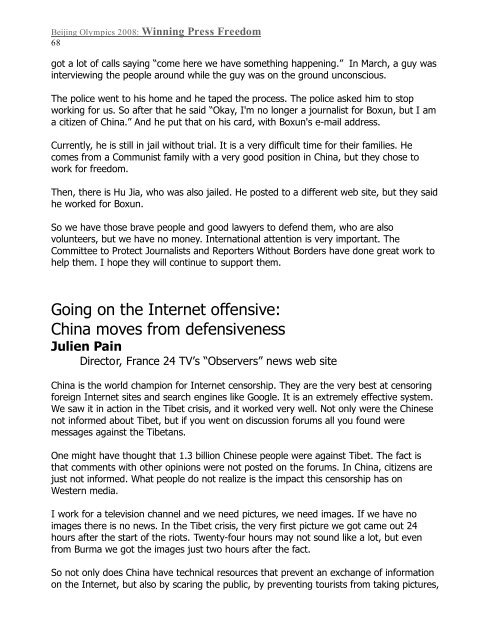Beijing Olympics 2008: Winning Press Freedom - World Press ...
Beijing Olympics 2008: Winning Press Freedom - World Press ...
Beijing Olympics 2008: Winning Press Freedom - World Press ...
Create successful ePaper yourself
Turn your PDF publications into a flip-book with our unique Google optimized e-Paper software.
<strong>Beijing</strong> <strong>Olympics</strong> <strong>2008</strong>: <strong>Winning</strong> <strong>Press</strong> <strong>Freedom</strong><br />
68<br />
got a lot of calls saying “come here we have something happening.” In March, a guy was<br />
interviewing the people around while the guy was on the ground unconscious.<br />
The police went to his home and he taped the process. The police asked him to stop<br />
working for us. So after that he said “Okay, I'm no longer a journalist for Boxun, but I am<br />
a citizen of China.” And he put that on his card, with Boxun's e-mail address.<br />
Currently, he is still in jail without trial. It is a very difficult time for their families. He<br />
comes from a Communist family with a very good position in China, but they chose to<br />
work for freedom.<br />
Then, there is Hu Jia, who was also jailed. He posted to a different web site, but they said<br />
he worked for Boxun.<br />
So we have those brave people and good lawyers to defend them, who are also<br />
volunteers, but we have no money. International attention is very important. The<br />
Committee to Protect Journalists and Reporters Without Borders have done great work to<br />
help them. I hope they will continue to support them.<br />
Going on the Internet offensive:<br />
China moves from defensiveness<br />
Julien Pain<br />
Director, France 24 TV’s “Observers” news web site<br />
China is the world champion for Internet censorship. They are the very best at censoring<br />
foreign Internet sites and search engines like Google. It is an extremely effective system.<br />
We saw it in action in the Tibet crisis, and it worked very well. Not only were the Chinese<br />
not informed about Tibet, but if you went on discussion forums all you found were<br />
messages against the Tibetans.<br />
One might have thought that 1.3 billion Chinese people were against Tibet. The fact is<br />
that comments with other opinions were not posted on the forums. In China, citizens are<br />
just not informed. What people do not realize is the impact this censorship has on<br />
Western media.<br />
I work for a television channel and we need pictures, we need images. If we have no<br />
images there is no news. In the Tibet crisis, the very first picture we got came out 24<br />
hours after the start of the riots. Twenty-four hours may not sound like a lot, but even<br />
from Burma we got the images just two hours after the fact.<br />
So not only does China have technical resources that prevent an exchange of information<br />
on the Internet, but also by scaring the public, by preventing tourists from taking pictures,





